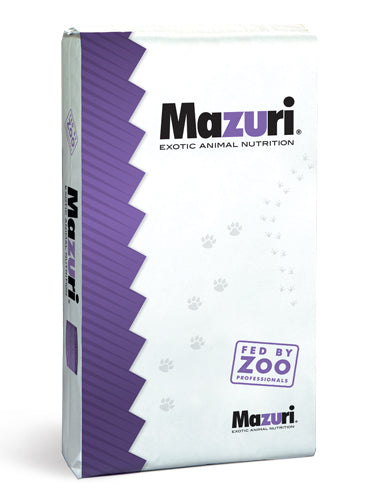Every exotic animal deserves the right nutrition
| Crude protein not less than Crude fat not less than Crude fiber not more than Moisture not more than Calcium not less than Calcium not more than Phosphorus not less than |
15.0% 3.0% 18.0% 12.5% 0.95% 1.45% 0.60% |
Ground Soybean Hulls, Ground Corn, Dehulled Soybean Meal, Ground Oats, Wheat Middlings, Cane Molasses, Dehydrated Alfalfa Meal, Wheat Germ, Dicalcium Phosphate, Soybean Oil, Brewers Dried Yeast, Calcium Carbonate, Salt, DL-Methionine, Choline Chloride, Pyridoxine
Hydrochloride, D-Alpha Tocopheryl Acetate (Form of Vitamin E), Biotin, Cholecalciferol, Menadione Sodium Bisulfite Complex (source of Vitamin K), Calcium Pantothenate, Vitamin A Acetate, Folic Acid, Riboflavin Supplement, Gelatin, Preserved with Mixed Tocopherols (Form of Vitamin E), Rosemary Extract, Nicotinic Acid, Vitamin B-12 Supplement, Thiamine Mononitrate, Citric Acid, L-Lysine, Manganous Oxide, Zinc Oxide, Ferrous Carbonate, Copper Sulfate, Zinc Sulfate, Calcium Iodate, Sodium Selenite, Cobalt Carbonate.
- Feed approximately 1-4% of body weight.
- It is not necessary to moisten pellets with water, though it may help acclimate animals to the diet.
- Feed consumption will vary with environmental temperatures, activity and life stage.
- Provide good quality grass hay or browse.
- If desired, feed fresh fruits and vegetables.
- At most, 5% fruit and 20% vegetables by weight of total diet.
- Always provide animal with plenty of fresh, clean water. Proper humidity levels are also critical for health and proper growth of herbivorous reptiles.
For best results store contents of open paper sack in container with sealing lid. Store in a cool (75°F or colder), dry (approximately 50% RH) location. Freezing will not harm the diet and may extend freshness. Use within 1 year of bag manufacturing.
Ask Our Experts
Get nutrition advice you can trust from experts who understand the unique nutritional needs and behaviors of your exotic animals.
Get Advice